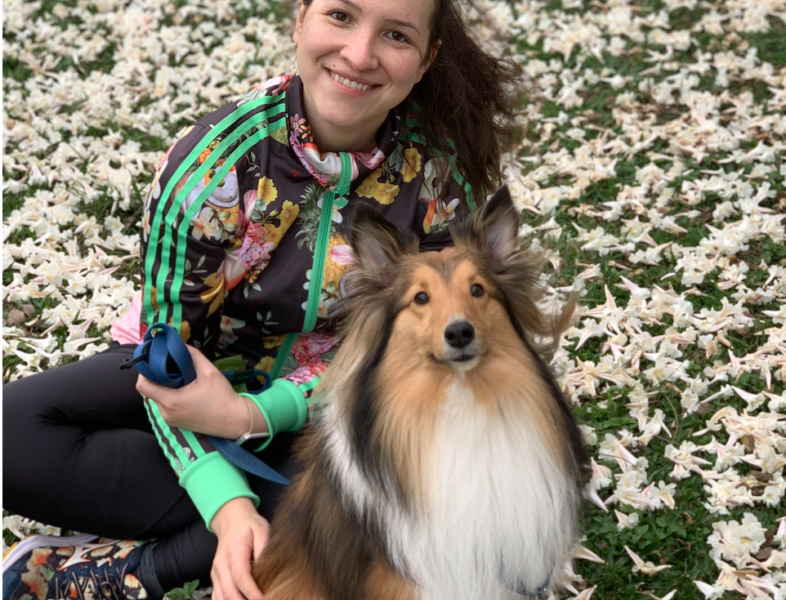
Ana Paula Rocha – Front-end Developer at Beleaf
By galtalkstech.com on June 26, 2020, in Interviews, South AmericaI think about how unfair it is that women have historically had a very important role in shaping technology, and yet, been erased in so many ways.
Ana is based in Sao Paulo – Brazil, and is currently a front-end developer at Beleaf. She loves thinking up and building great interfaces. She also enjoys running, cooking and walking her dog, Risotto.
In a Nutshell: Tell us a bit about your job and what role technology plays in it?
I’m currently a front-end developer at a company that sells plant-based meals, and technology is definitely at the very core of the operation. Our main touchpoint with clients is through our website, so my job is to help implement interfaces that make the purchasing experience smooth and free of any hassle.
Where did your professional journey start and how did you get to where you are now?
At age 30 I joined a free bootcamp for women who were interested in learning more about technology, and after building that foundation I was sure that this is what I wanted to pursue.
My background is actually in communication, but after four years of leading marketing teams I decided to make a career switch. During that time, I had a chance to work in digital products through a marketing perspective and became interested in how those projects came to life. At age 30 I joined a free bootcamp for women who were interested in learning more about technology, and after building that foundation I was sure that this is what I wanted to pursue. I’ve have been working full-time in front-end development ever since.
What is the greatest transformation in technology you’ve witnessed in your career?
Everything happens really fast, so even in these short 4 years I’ve already seen some pretty cool movements in terms of exploring alternate interfaces. I’m very interested in how the field is evolving now that user-facing doesn’t necessarily mean a formal screen or device. For example, new and exciting developments in voice-based technology that are becoming part of every-day life, VR improvements, or new IoT-based devices that demand new ways of thinking interfaces and how the user can interact.
When you think about ‘women’ and ‘technology’ what comes to your mind first?
I think about how unfair it is that women have historically had a very important role in shaping technology, and yet, been erased in so many ways. And when this fallacy – that women aren’t interested in STEM – keeps being repeated, it pushes new generations away. I remember being young and never even considering a career in technology because the environment seemed hostile. Being a woman in technology means putting in extra effort to find your space, stand your ground, and help bring more women along, so hopefully in the near future they’ll find a more inclusive industry from the start.
We always hear there are not enough women working in Tech. What needs to happen to change that, which steps should be done to achieve gender equality in tech?
We need more women in leadership roles, more women developing solutions, and more women being encouraged to study technology.
I believe everyone needs to work on building a more inclusive industry and no isolated measure will do – this needs to be an industry-wide effort. Women have to be a part of the conversation and be included in every step of the way: we need more women in leadership roles, more women developing solutions, and more women being encouraged to study technology.
How different would our world be if more women worked in STEM?
Very different, in the sense that technology could address problems that today are ignored in large part because women are not part of the decision process. We need different views and experiences to reach innovation and if the industry keeps excluding such a huge share of the population, then it’ll keep missing out on opportunities.
Which was the best decision in your career?
I think the world is seeing the catastrophic results that unethical use of technology can bring, and more than ever it’s important to be responsible for your professional contribution to society.
The best one was deciding to go forward with learning about development and sticking to that decision. But a close second would be deciding to only lend my skills to companies that I fully believe in – that serve an ethical purpose and that think about technology as a tool to improve people’s lives. I think the world is seeing the catastrophic results that unethical use of technology can bring, and more than ever it’s important to be responsible for your professional contribution to society.
What advice would you give to women who want a tech career?
Keep going and reach out to allies who can help you along this journey. Find inclusive communities, a mentor who inspires you, and of course, get involved in helping others as well. We can all learn, teach and improve with each other. 🙂
Ana Paula Rocha is based in Sao Paulo – Brazil, and is currently a front-end developer at Beleaf. She loves thinking up and building great interfaces. She also enjoys running, cooking and walking her dog, Risotto.
See more interviews of our amazing Gals.
